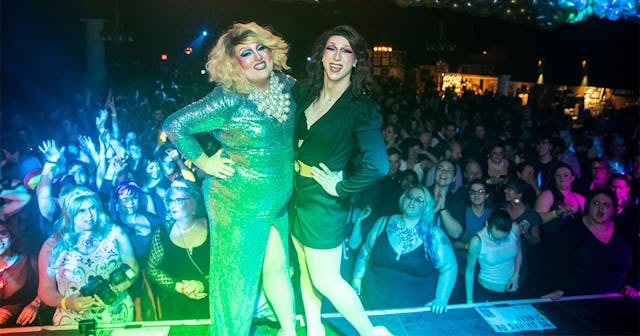Drag Queens Are Taking The Drag Out Of The Pandemic

Most folks are working from home in stained t-shirts and sweat pants—or no pants at all. We are dragging ourselves through the day, throwing our arms into the air, and shaking our fits at all of this. Life is uncertain, homeschooling is all but officially cancelled, and it feels like the demand of all of the roles we have to play will break us.https://www.scarymommy.com/best-trivia-questions-answers/
But if anyone can teach us about adversity, it’s the drag community. Marsha P. Johnson was a self-identified drag queen and one of the prominent figures of the Stonewall riots. She led the fight for LGBTQ rights and paved the way for so many queer folks to live safe and authentic lives. Drag queens continue to do this work, but the way they have shown up during the pandemic has highlighted the resiliency and goodness we can all learn from. *Glares at the gun-toting protesters, conspiracy theorists, and entitled assholes who are too “bored” to stay home.* Even during a national lockdown, the show must go on.
Courtesy of James Buck
When social distancing went into full effect, the places where drag performers earned the bulk of their income closed. Without bars, restaurants, clubs, Pride centers, or other venues that draw a crowd, drag queens lost their audiences and regular gigs which included substantial tips.
Queens have had to cancel all performances and aren’t sure when they’ll be able to resume their in-person entertainment, but they have found a way to turn their living rooms into stages. Facebook Live, Zoom, and websites like StageIt have allowed performers to still earn money while unemployed and stuck at home. It’s not just their resourcefulness, but also their determination to uplift people’s spirits that make drag queens stars.
A restaurant in Indiana called Fiddleheads is offering Dragside Pickup. Wearing heels, gloves, and a mask with lips drawn on, Jayda Pill is one of the performers who will deliver food to people’s car. The community loves it and feels infected with joy. One customer said, “This is for fun. This is to put a smile on your face. This is to show that better days are ahead for all of us.”
Taylor Small, Director of Health & Wellness at the Pride Center of Vermont, performs as Nikki Champagne with her stage partner Emoji Nightmare. She knows the importance of representation for the queer community. She tells Scary Mommy that when she performs, “Not only am I able to create space for folx of all genders, sexualities, identities to come together in a safe(r) space, but I am also creating that for myself. Emoji and I pride ourselves on creating events that are inclusive beyond LGBTQ+ identities, and are always working to improve and expand.”
Courtesy of Taylor Small
Drag queen story hours have become increasingly popular safe spaces at school and public libraries for kids and adults. Even Sesame Street invited Billy Porter on air to show the beauty in diversity while breaking down gender stereotypes. Most in-person story hours are trolled by idiots who think drag queens reading books to kids about kindness and love are child abusers, but Small says the hate is always eclipsed by the love and support of people who show up to listen to stories and sing songs with fabulous queens.
Representation reduces bullying, increases self-esteem, and improves the feeling of isolation. We’re all feeling very isolated right now, especially the queer and gender diverse kids and students who don’t have allies or clubs at school to find support. COVID-19 has forced story hours to go online, but libraries and LGBTQIA+ organizations have made sure to create virtual safe spaces. Family Equality recently had Nina West from RuPaul Drag Race host a live story hour, and it was amazing.
Courtesy of Tal Saidon
We are all looking for ways to find meaningful connections within our communities. We want to help, but feel helpless ourselves at times. There are many resources, suggested guides, and programs available, but it can be hard to cut through the noise of so much information.
In order to best reach community members, Taylor Small tells Scary Mommy that the University of Vermont Medical Center in Burlington created a PSA called Coronavirus is a Drag to educate citizens on ways to access support during the pandemic. The stars of the PSA were drag queens and local queer icons. Small, AKA Nikki Champagne, says, “They chose [these people] to deliver the information in an approachable, easy-to-understand, and comical way. LGBTQ+ community members see themselves reflected in community initiatives, but it is also providing a form of education for the cis/het folx out there who may need to do some more learning.”
Learning is something I have been worried about, and not in regard to my children’s homeschooling. As a LGBTQIA+ educator, all of my trainings and speaking engagements have been canceled. I’m worried about the regression that will happen for queer rights and the basic understanding of what queer youth and students need at home and school. But when it feels as though all momentum has stopped, seeing events like virtual Drag Brunches or LGBTQIA+ Sex Trivia hosted by Pride Center of Vermont and Planned Parenthood of Northern New England reminds me that we may have been slowed down, but we can’t be stopped.
Nikki Champagne does have one piece of advice about our coronavirus wardrobes, however. “When you’re working from home, continue to dress to impress—it will not only make your coworkers jealous, but it has also been shown to improve your mood. Folx believe that we put on beautiful outfits for other people but truly it’s for us! We know how fabulous we look and it feels so much better because the only person who matters is you.”
Through Zoom or bedazzled masks, the drag community shows us that now — maybe more than ever — is the time to sparkle.
This article was originally published on